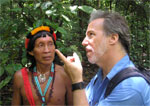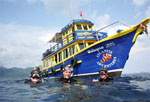FEATURED ARTICLES
An interview with ethnobotanist Dr. Mark Plotkin:
Indigenous people are key to rainforest conservation efforts
(10/31/2006) Tropical rainforests house hundreds of thousands of species of plants, many of which hold promise for their compounds which can be used to ward off pests and fight human disease. No one understands the secrets of these plants better than indigenous shamans -medicine men and women - who have developed boundless knowledge of this library of flora for curing everything from foot rot to diabetes. But like the forests themselves, the knowledge of these botanical wizards is fast-disappearing due to deforestation and profound cultural transformation among younger generations. The combined loss of this knowledge and these forests irreplaceably impoverishes the world of cultural and biological diversity. Dr. Mark Plotkin, President of the non-profit Amazon Conservation Team, is working to stop this fate by partnering with indigenous people to conserve biodiversity, health, and culture in South American rainforests. Plotkin, a renowned ethnobotanist and accomplished author who was named one of Time Magazine's environmental "Heroes for the Planet," has spent parts of the past 25 years living and working with shamans in Latin America. Through his experiences, Plotkin has concluded that conservation and the well-being of indigenous people are intrinsically linked -- in forests inhabited by indigenous populations, you can't have one without the other. Plotkin believes that existing conservation initiatives would be better-served by having more integration between indigenous populations and other forest preservation efforts.
[
Conservation | Amazon | Interviews]
Bacteria can generate renewable energy from pollution,
help fight global warming

|
|
(10/26/2006) Currently, most energy production generates carbon dioxide, a potent greenhouse gas that contributes to global warming and local pollution. At the same time that carbon dioxide concentrations are rising in the atmosphere, fueling higher temperatures, burgeoning population growth of humans and livestock is producing ever-increasing amounts of organic pollution and waste. Now researchers at the Center for Biotechnology at the Biodesign Institute of Arizona State University are working on a way to solve both problems using bacteria to convert organic wastes into a source of electricity. Bruce Rittmann, Director of the Center for Environmental Biotechnology at the Biodesign Institute, and his team of researchers are developing microbial fuel cells (MFC) that can oxidize organic pollutants and create electricity from pollution.
[
Energy]
Bacteria can ensure clean water say researchers

|
|
(10/25/2006) Water is shaping up to be one of the most critical problems facing humanity. With water consumption far outstripping population growth rates due to surging industrial and agricultural demand, the World Bank estimates that 40 percent of the world's population -- more than 2.5 billion people -- are enduring some form of water scarcity. Still water experts argue that the problem is not a fundamental lack of water -- there is in fact plenty of freshwater to go around -- but where it's located and growing levels of pollution. Even in places where water is not scarce, it is often contaminated or "impaired" with natural containments and fertilizer runoff containing nitrates and perchlorate. While systems exist for dealing with these problems, they typically concentrate compounds and are costly to maintain, especially in poor parts of the world where water is most needed. This may all soon change. Researchers at Arizona State's Biodesign Institute have devised a way for bacteria to do the dirty work -- converting wastewater to clean drinking water using a minimal amount of energy and generating no harmful waste.
[
Green Business]
Amazon conservation efforts must come soon
to save world's largest rainforest says leading scientist

|
|
(10/23/2006) There is an immense threat looming on the horizon: climate change could well cause most of the Amazon rainforest to disappear by the end of the century. Dr. Philip Fearnside, a Research Professor at the National Institute for Research in the Amazon in Manaus, Brazil and one of the most cited scientists on the subject of climate change, understands the threat well. Having spent more than 30 years in Brazil and now recognized as one of the world's foremost experts on the Amazon rainforest, Fearnside is working to do nothing less than to save this remarkable ecosystem. Fearnside believes saving the Amazon will require a fundamental shift in perception where the Amazon is recognized as an asset beyond the current price of mahogany, soybeans, or cattle, where its value is only unlocked by its destruction. The Amazon is far worth more than this he says. It can play a key role in fighting climate change while providing economic sustenance for millions through sustainable agriculture and rational utilization of its renewable products. It can serve as a storehouse for biodiversity while at the same time ensuring reliable water supplies and moderating regional temperature and precipitation. In short, maintaining the Amazon as a viable ecosystem makes sense economically and ecologically -- it is in our best interest to preserve this resource while we still can.
[
Interviews | Amazon]
Traditional customs pit young versus old in Indonesia's Torajaland

|
|
(10/19/2006) The Torajanese people of Central Sulawesi, Indonesia, have long been renown for their extravagant celebrations of the dead in their funerals, graves and effigies. Just outside of Rantepao, the regional capital of Torajaland, ostentatious, costly and increasingly generationally divisive funerals take place on a regular basis. Like other indigenous cultures around the world, a growing rift between the young and old generations is calling the foundations of tradition into question. While Westerns and tribal elders lament the loss of culture and disappearing languages, sometimes there are more complicated forces underlying the transition.
[
Indonesia | Asia]
Saving China's golden monkey from extinction
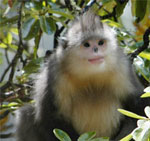
|
|
(10/18/2006) High in the cloud-shrouded Yunling mountains of northwestern Yunnan and southeastern Tibet (southwestern China) lives one of the world's most elusive monkeys, the Yunnan golden or snub-nosed monkey (Rhinopithecus bieti). Despite dwelling the most extreme environment of any monkey species -- high-altitude evergreen forests at elevations from 3000 - 4500 m (9800 - 14,800 feet) where temperatures may fall below freezing for several months in a row -- today there are less than 2000 of Yunnan snub-nosed monkeys remaining. Hunting and habitat loss has brought the species, which is limited to a single mountain range and fragmented into 15 small sub-populations at risk to genetic bottlenecks and inbreeding depression, to the brink of extinction.
[
China | Primates]
Rainforests face myriad of threats says leading Amazon scholar
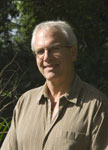
|
|
(10/16/2006) The world's tropical rainforests are in trouble. Spurred by a global commodities boom and continuing poverty in some of the world's poorest regions, deforestation rates have increased since the close of the 1990s. The usual threats to forests -- agricultural conversion, wildlife poaching, uncontrolled logging, and road construction -- could soon be rivaled, and even exceeded, by climate change and rising levels of carbon dioxide in the atmosphere. Understanding these threats is key to preserving forests and their ecological services for current and future generations. William F. Laurance, a distinguished scholar and president of the Association for Tropical Biology and Conservation (ATBC) -- the world's largest scientific organization dedicated to the study and conservation of tropical ecosystems, is at the forefront of this effort. Laurance, who as a senior staff scientist at the Smithsonian Tropical Research Institute has spent years studying the ecological impacts of habitat fragmentation and degradation in tropical forests, is actively involved in conservation efforts and development policy in the Amazon and central Africa.
[
Featured | Interviews]
Forest fires result from government failure in Indonesia

|
|
(10/15/2006) Indonesia is burning again. Smoke from fires set for land-clearing in South Kalimantan (Borneo) and Sumatra are causing pollution levels to climb in Singapore, Kuala Lumpur, and Bangkok, resulting in mounting haze-related health problems, traffic accidents, and associated economic costs. The country's neighbors are again clamoring for action but ultimately the fires will burn until they are extinguished by seasonal rains in coming months. The fires -- and their choking haze -- have become a yearly occurrence in Indonesia. Some years are worse than others -- especially when dry el Niño conditions turn the region's forests into a tinderbox -- but the overall trend is not encouraging. Fault should lie first with the Indonesian government for its systematic failure to enforce laws designed to reduce the country's appalling rate of deforestation. Since 1990 official figures show Indonesia has lost a quarter of its forest cover. Loss of primary forests has been even worse: nearly 31 percent of the archipelago's old growth forest have fallen to loggers and land developers over the same period. Menacingly, deforestation rates are not slowing. Annual forest loss has accelerated by 19 percent since the close of the 1990s, while yearly primary forest loss has expanded by 26 percent. These statistics should be an embarrassment to Indonesia and are testament to the government's impotence in dealing with forest loss and incompetence in reigning in cronyism and corruption.
[
Indonesia]
Shift from hard drives to flash may have environmental benefits

|
|
(10/13/2006) Fujitsu announced it will start shipping PCs that use NAND-flash drives instead of standard hard drives. While the new format will be substantially more expensive -- on the order of $670 to replace a 20GB hard drive with a 16GB worth of flash memory -- it will make the laptops lighter and more shock-resistant, extend battery life by 30 minutes and improve system performance on start-up. The shift may have ancillary benefits as well: less energy usage and reduction of components that use metals.
[
Technology]
China pictures
(10/09/2006) Many Americans probably think of China as a land of crowded cities (Shanghai) and expansive agricultural areas. In reality much of China, like the United States, is wilderness, with low population density, magnificent landscapes, and cultural diversity. On my recent trip I visited two regions that fit this description: Xinjiang in far western China, near the border of Tajikistan, Pakistan, and Afghanistan; and northwestern Yunnan, historically and culturally the southeastern-most part of Tibet.
[
Travel]
Photos from Xinjiang, a Muslim region in western China
(10/09/2006) Xinjiang, China's largest and western-most province, is one of the planet's most remote and desolate regions. Covering more than one-sixth the country's territory, Xinjiang borders Tibet, Mongolia, Russia, Kazakhstan, Kyrgyzstan, Tajikistan, Afghanistan, and Pakistan, and is dominated by ethnic minorities, notably the Muslim Uyghurs who make up nearly half the 18 million who live in the province. Xinjiang's ethnic mix reflects its historical importance as a central part of the Silk Road, a trading route used since ancient times to transport good between East and West. In September 2006, I, along with two friends, visited this distant land of breath-taking landscapes and fascinating local culture. The purpose of our trip was to visit Datong, a Tajik village located deep in the Kunlun Shan mountains of Xinjiang. Along the way I took hundreds of photos and met dozens of kind and wonderful people.
[
China]
A look at the biodiversity extinction crisis
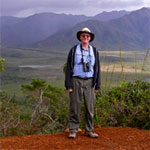
|
|
(10/06/2006) As tropical forests -- the world's biological treasure troves -- continue to dwindle, biologists are racing to devise ways to save them and their resident biodiversity. While many conservation biologists talk about population viability analysis and intricacies of reserve layouts, David L. Pearson, a research professor at the School of Life Sciences at Arizona State University (ASU) in Tempe, Arizona, focuses on a different approach: education. Pearson, whose work includes hundreds of books and papers including a series of beautifully illustrated wildlife guides for regions in Latin America, believes that lack of knowledge about ecosystems is one of the most significant hurdles to addressing the present biodiversity crisis. Fluent in five languages and able to "get along" in several more, Pearson conducts week-long workshops around the world to explain the basics of biodiversity and introduce "critical thinking" to audiences that include local government officials, business people, educators, students, and environmentalists. Pearson's trips are largely self-financed, though he says seeing the enthusiasm of workshop participants in developing countries is reward in and of itself.
[
Biodiversity]
NEWS UPDATES
Global warming tops list of Americans' environmental concerns
(10/31/2006) Americans now rank climate change as the country's most important environmental concern according to a survey released today by MIT. The poll found that almost three-quarters of the respondents felt the government should do more to deal with global warming and 60 percent agreed that there's enough evidence to warrant some level of action. It also found that individuals were willing to contribute their own money to help prevent climate change - am average of $21 more per month on their electricity bill to "solve" global warming.
[
Climate Change]
Blair says U.S. must act on global warming
(10/30/2006) Delaying action on global warming will take the planet into "dangerous territory" warns a new report released Monday by the British government. In The Sun Tony Blair, Britain's Prime Minister called the report "the important document on the future" he's read since becoming Prime Minister. "The Stern Report should be seen across the globe as the final word on why the world must act now to limit the damage we are doing to our planet," said Blair. "The conclusions are a wake-up call to every country in the world. The case for action is the final piece of the jigsaw to convince every single political leader, including those in America, China and India, that this must be top of their agenda. The report is clear: We are heading towards catastrophic tipping points in our climate unless we act."
[
Climate Change]
Oregon dead zone event over, but cause still unknown
(10/30/2006) The hypoxic dead zone off the coast of Oregon has finally dissipated but researchers still don't know why it has formed each of the past summers. The dead done, characterized by low oxygen levels, formed in mid-June this year and killed thousands of crabs, sea stars and marine worms. It was the strongest event ever recorded in the area.
[
Oceans]
100 species discovered in Hawaii
(10/30/2006) A three-week scientific expedition to America's newest marine park, the Northwestern Hawaiian Islands Marine National Monument, may have discovered 100 species of marine creatures including crabs, corals, sea cucumbers, sea quirts, worms, sea stars, snails, and clams.
[
Oceans]
Global warming could cause insect population explosion
(10/29/2006) Global warming may prove to be a boon to insects according to new research published in the October edition of the journal The American Naturalist.
[
Climate Change]
Energy development threatens Pumalin nature sanctuary in Chile's Pantagonia

|
|
(10/27/2006) The Pumal"n nature sanctuary, 700,000 acres of dense, primordial green, belongs to a wealthy American named Douglas Tompkins. The biodiversity of the place is staggering. Half the plants here grow nowhere else on the planet. Soaring above the forest canopy are Pumal"n's prized alerce trees, known as "the redwoods of the Andes." The Linnaean name for the alerce is Fitzroya cupressoides; Charles Darwin named the tree for Robert FitzRoy, captain of the HMS Beagle, when he visited Chile in the 1830s. The alerce can grow as high as 200 feet. Smitten by its light weight, straight grain, and resistance to rot, loggers loved it almost to death. The alerces in Pumal"n are some of the last survivors, and the near destruction of the tree is a kind of Chilean morality tale, for this is a country whose economy is based, to an extreme degree, on the extraction of raw materials and the destruction of natural resources.
[
Conservation]
Rains bring haze reprieve in Indonesia, Singapore
(10/27/2006) Rain has brought a temporary reprieve for areas affected by forest fires-caused haze in Indonesia according to a report from Reuters. Officials at Sultan Thaha airport in Jambi province, on the island of Sumatra, said that planes are again taking off and landing after a 10-day closure due to low visibility, according to Reuters. In Singapore, the pollution index was at 19, down from Thursday's reading of 38, and a high of 128 on October 7, its worst level since the 1997-1998 fires. In Kuala Lumpur, the Air Pollution Index stood at 24 on Thursday, down from 72 on Tuesday, according to local reports.
[
Indonesia]
Amazon deforestation rate plunges 41 percent
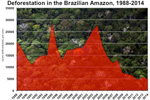
|
|
(10/26/2006) Today the Brazilian government announced a sharp drop in Amazon deforestation. Forest loss for the 2005-2006 year was 13,100 square kilometers (5,057 square miles) of rainforest, down more than 40 percent from last year. The figure is the lowest since 1991 when 11,130 square kilometers (4,258 square miles) of forest were lost. Deforestation peaked in 1995 when 29,059 square kilometers (11,219 square miles) of forest were cut. Deforestation has plunged by almost 50 percent since 2004. Falling commodity prices, increased enforcement efforts, and government conservation initiatives are credited for the drop.
[
Amazon | Brazil]
Brazil claims soy and beef not responsible for Amazon deforestation
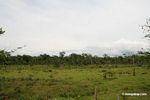
|
|
(10/26/2006) Brazil rejected claims that soybean farms and cattle pasture were destroying the Amazon rainforest, according to a report from Reuters. At the opening of an organic food products fair in Sao Paulo, Agriculture Minister Luis Carlos Guedes Pinto said that only 0.27 percent of Brazil's soybean crop is grown in the Amazon region, while less than 1.5 percent of Brazil's beef for export comes from the rainforest. Brazil is the world's biggest beef exporter and number 2 soy exporter after the United States. During the 2005-2006 growing year, Brazil produced a record 53.4 million tons of soybeans.
[
Amazon]
Animal pollinators responsible for 35 percent of world food crop
(10/25/2006) A new study calculates that 35 percent of the world's crop production is dependent on pollinators, like bats, bees, and birds. The research suggests that biodiversity loss could directly impact global food crops.
[
Biodiversity]
Biodiversity extinction crisis will disrupt important ecological services
(10/25/2006) Loss of biodiversity will have an ecologically-costly impact according to a study published in the journal Nature this week. The new study, headed by a biologist at the University of California, Santa Barbara (UCSB), found that species extinction will reduce nature's ability to maintain ecological balance and "services" such as water filtration, nutrient cycling, and pollination.
[
Biodiversity]
Global warming could put New York City at hurricane, flood risk
(10/25/2006) NASA researchers are investigating the potential impact of climate change on New York City using computer models to simulate future climates and sea level rise. Their studies, to date, forecast a 15 to 19 inch-increase in sea levels by the 2050s that could put the city at higher risk of flooding during storm surges.
[
Climate Change]
Wood stoves in poor countries worse than expected for global warming
(10/25/2006) Wood stoves used in developing countries emit more harmful smoke particles and could have a much greater impact on global climate change than previously thought, according to research published in the Nov. 1 issue of the American Chemical Society journal Environmental Science & Technology. The study's lead authors, Dr. Tami Bond of the Department of Civil & Environmental Engineering the University of Illinois, Urbana-Champaign and graduate student Christoph Roden, estimate that some 400 million of these stoves are used on a daily basis for cooking and heating by more than 2 billion people.
[
Climate Change]
"Eco vacationers" engage in cutting-edge environmental research
(10/24/2006) Jeff Greenwald, a California-based travel and science writer who is Executive Director of Ethical Traveler, an international alliance of dedicated to preserving the environment and protecting human rights, submitted his article on the growing "eco vacation" market. "Eco vacationers" are those who forsake relaxation on their holidays to engage in cutting-edge environmental research. He describes his trip with the Earthwatch Institute to assess the health of Thailand's coral reefs in Koh Chang.
[
Green Business]
Amazon river flowed into the Pacific millions of years ago

|
|
(10/24/2006) A new study adds further evidence the theory that the world's largest river, the Amazon, once flowed in the opposite direction, emptying into the Pacific Ocean. Researchers at the University of North Carolina at Chapel Hill (UNC) discovered "ancient mineral grains" in the central Amazon that could only have originated in now-eroded mountains that once existed in the central and eastern South America, not the more recently formed Andes in the west.
[
Amazon]
World Bank says carbon trading will save rainforests

|
|
(10/23/2006) Monday the World Bank endorsed carbon trading as a way to save tropical rainforests which are increasingly threatened by logging, agricultural development, subsistence agriculture, and climate change itself. The bank estimates that deforested land worth $200-500 per hectare as pasture could be worth $1,500-$10,000 if left as intact forest and used to offset carbon emissions from industrialized countries. The World Bank report comes on the heels of a proposal by a coalition of developing countries to seek compensation from industrialized countries for conserving their rainforests to fight global warming. Brazil is expected to announce a similar plan at upcoming climate talks in Nairobi.
[
Rainforests]
Largest seizure of illegally logged Amazon rainforest timber announced by authorities
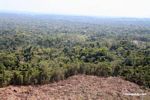
|
|
(10/23/2006) IBAMA, Brazil's environmental agency, announced the largest seizure ever of illegally logged timber from the Amazon rainforest. During a week-long operation -- code named Kojima -- in late September, authorities impounded nearly 15,000 cubic meters of unlicensed wood in the Amazonian state of Para. The agency said it was probably the largest seizure ever in the state. Para was the state where last year Sister Dorothy Stang, an American nun who worked with rural poor, was killed by gunman associated with local plantation owners. In response to the murder, the Brazilian government sent in the army to quell violence in the region and promised to step up environmental monitoring efforts.
[
Amazon]
Pet trade and habitat loss decimating wild macaw populations

|
|
(10/23/2006) Macaws, the world's largest parrots, are declining in the wild due to over-zealous collecting for the pet trade, poaching, and habitat loss according to a researcher at Texas A&M University. Dr. Don Brightsmith, a bird specialist at Texas A&M University's Schubot Exotic Bird Center, says that of the world's 17 species of macaws, one is extinct, another is extinct in the wild, and seven are endangered. All are suffering population declines in the wild. Brightsmith, it is critical that scientists learn more about macaw ecology. "[We] need to learn more about their breeding habits, their migration routes, more about their diet and many other things," he added. "The more we learn about these birds, the better our chances to save them."
[
Amazon]
Evolution: less food = smaller brain in orangutans

|
|
(10/23/2006) A new study has linked diet to evolutionary brain size in orangutans living on the Indonesian islands of Borneo and Sumatra. The research, published in the Journal of Human Evolution by researchers from Duke University and the University of Zurich, found that orangutans inhabiting areas in Borneo where food supplies are frequently depleted may have evolved comparatively smaller brains than orangutans living in more fruitful parts of Sumatra. The scientists noted that the biggest difference were found between orangutans living in Sumatra, which is less affected by El Niño disruptions than can reduce the availability of fruit, and northeastern Borneo, where "soils are poorer, access to fruit is most iffy and the impact of El Niño events can be significant."
[
Primates]
Tiny crab protects coral
(10/23/2006) Researchers have discovered a symbiotic relationship between tiny crabs and coral in the South Pacific. The relationship between the crab and the coral is detailed in the November 2006 issue of the journal Coral Reefs.
[
Coral Reefs]
Grey whales missing from traditional feeding grounds

|
|
(10/23/2006) Researchers found few grey whales in their traditional feeding grounds in the North Pacific last summer according to a scientist at the University of Bath. Dr. William Megill, a professor of mechanical engineering with special interest in biomimetics at the University of Bath, said that the absence of the 17,000 grey whales from traditional summer feeding grounds in the North Pacific could be cause for concern, despite the species' recent removal from the endangered species list.
[
Oceans]
Ozone hole is the largest and deepest ever recorded
(10/19/2006) NASA and National Oceanic and Atmospheric Administration scientists that this year's Antarctic ozone hole is the largest and deepest ever recorded.
[
Earth Science]
Tremendous loss of ice in Greenland finds new NASA study
(10/19/2006) New research has found that commercial fishing can cause significant fluctuations in marine fish populations. Writing in Nature, scientists from several institutions and agencies argue that fishing can amplify the highs and lows of natural population variability. The researchers believe that fished populations become less stable due to the removal of larger, older individuals most capable of reproduction, leaving the population vulnerable to natural stresses like El Niño.
[
Greenland-Artic]
Climate change to cause more extreme weather
(10/19/2006) Climate change will cause extreme weather to be a more common occurrence according to new computer modeling by researchers from the National Center for Atmospheric Research (NCAR), Texas Tech University, and Australia's Bureau of Meteorology Research Centre.
[
Climate Change]
Population of bizarre Mongolian antelope plunges 95% in 15 years

|
|
(10/19/2006) A group of scientists led by the New York-based Wildlife Conservation Society (WCS) working in Mongolia's windswept Gobi Desert recently fitted high-tech GPS (Global Positioning System) collars on eight saiga antelope in an effort to help protect one of Asia's most bizarre-looking -- and endangered -- large mammals
[
Biodiversity]
Brazil says no to rainforest privatization plan, asks Gore for help

|
|
(10/18/2006) On Tuesday Brazil rejected a alleged British proposal to fight climate change by "privatizing" parts of the Amazon rainforest, according to Reuters. In an editorial published on the opinion page of Folha de S.Paulo newspaper, Environment Minister Marina Silva and Foreign Minister Celso Amorim said that the Amazon was "not for sale". The report, which originally appeared in Britain's Sunday Telegraph newspaper on October 1, 2006, said that David Miliband, Britain's Environment Secretary, planned an initiative that would turn parts of the Amazon into an "international trust" wherein credible buyers could lockup parts of the rainforest for preservation. However, shortly after the article was published, Miliband's office denied the story.
[
Brazil | Amazon]
Commercial fishing can cause fish population imbalance
(10/18/2006) New research has found that commercial fishing can cause significant fluctuations in marine fish populations. Writing in Nature, scientists from several institutions and agencies argue that fishing can amplify the highs and lows of natural population variability. The researchers believe that fished populations become less stable due to the removal of larger, older individuals most capable of reproduction, leaving the population vulnerable to natural stresses like El Niño.
[
Oceans]
Expanded XML feeds for mongabay.com
(10/18/2006) I've added 50+ xml feeds for different news topics on mongabay.com. The most popular appear here, while the full list appears here.
Rainforest Questions & Answers
(10/18/2006) It has taken nearly 4 years but I finally updated the mongabay.com "virtual" interview page. The interview answers a number of the frequently asked questions about the site.
Google worried about global warming?

|
|
(10/17/2006) Google said it plans to build a solar-powered electricity system at its Silicon Valley headquarters that will be the largest solar installation on any corporate campus in the United States. The web search firm says it will generate enough electricity to power about 1,000 average California homes using parking lot and root-top solar panels. Google says the solar power will offset roughly 30% of its peak electricity consumption at the buildings where the panels are installed.
[
Energy | Green Business]
China needs 5 million cubic meters more of tropical timber by 2010
(10/16/2006) China needs 5 million cubic meters more of tropical timber by 2010 according to the September 15-30 ITTO Tropical Timber Market Report, a publication published by the International Tropical Timber Organization. China is already the world's largest consumer of tropical wood, importing more than twice the volume of tropical logs as India, the second largest importer on the list.
[
China]
Brazil proposes compensation plan for rainforest conservation
(10/16/2006) Last month Brazil proposed the establishment of a fund to compensate developing countries that reduce deforestation, a move that follows a similar initiative by a coalition of developing countries led by Papua New Guinea and Costa Rica. The scheme could help cut greenhouse gas emissions that result from forest clearing and conversion. Deforestation currently is responsible for 20-25 percent of such heat-trapping emissions.
[
Brazil]
US population set to break 300m Tuesday

|
|
(10/16/2006) The U.S. population is expected to reach 300 million people on Tuesday, October 17 according to the U.S. Bureau of the Census. The world's largest economy has the fastest population growth (0.91 percent) of G-8 countries, meaning the country adds another 2.8 million people a year, equivalent to the addition of another Arkansas or Kansas. The United States is the third largest country in the world, behind China and India
[
Population]
Malaysia adopts new remote sensing technology to detect illegal forest burning
(10/16/2006) Last month Malaysian Deputy Prime Minister Sri Najib Tun Razak announced that Malaysia will use a new remote sensing technology to detect illegal logging and forest fires in the country.
[
Deforestation]
Mongabay.com wildlife photo sections updated
(10/13/2006) The wildlife photo sections have been updated to include images from my latest travels.
[
Travel]
Unchecked global warming will cost trillions says report

|
|
(10/13/2006) A new Friends of the Earth-backed report by economists at Tufts University's Global Development and Environment Institute says that global warming could cost trillions of dollars should temperature increases exceed two degrees centigrade (3.6 degrees Fahrenheit). The report estimates annual economic damages could reach $20 trillion by 2100, equivalent to six to eight percent of global economic output at that time, but that action to limit temperature increases to two degrees centigrade could avoid $12 trillion in annual damages at a quarter of the cost.
[
Economics | Climate Change]
Phytoplankton generate about five times as much energy as humans finds study
(10/13/2006) A new study estimates that oceanic phytoplankton generate about five times the annual total energy consumption of humans. Florida State University Professor William Dewar calculated the amount of amount of chemical power stored annually by phytoplankton at 63 terawatts. For comparison, in 2001 all humanity consumed 13.5 terawatts of power.
[
Oceans | Climate Change]
Insurance industry needs to do more to fight global warming
(10/13/2006) The insurance industry needs to do more to address the growing impact of climate-change induced damaged according to a report issued this week by insurance giant Allianz and environmental group WWF.
[
Economics | Climate Change]
Shell estimates cost of fighting climate change at 0.3% GDP
(10/13/2006) A new report by Shell Oil estimates that the cost of fighting climate change in the Britain by 2010 would be equivalent to just 0.3 percent of GDP. The report also says that the effort to address climate change could be worth £30bn ($56 billion) to businesses in the UK.
[
Economics | Climate Change]
Methane from peat bogs may worsen global warming
(10/12/2006) New research says that methane released from peat bogs at the end of the past ice age worsen global warming. The study warns that a similar event could worsen climate change by causing a rapid shift in atmospheric greenhouse gas concentrations.
[
Earth Science | Climate Change]
Big Oil and Tobacco Together in the denial industry? [external]
(10/12/2006) The Guardian carries an except from George Monbiot's new book Heat. In it he traces the origin of the climate change denial effort by Exxon and other firms. Surprising, he reveals that Big Tobacco played a role in the movement's start.
Global warming causing Alaska lakes to dry up
(10/12/2006) More than 10,000 Alaskan lakes "shrunk in size or completely dried up" between 1950 and 2002
according to according to a study published in the Journal of Geophysical Research--
Biogeosciences. The study says that during this period, "Alaska has experienced a warming climate with longer growing seasons, increased thawing of permafrost, and greater water loss due to
evaporation from open water and transpiration from vegetation; yet there has been no substantial change in precipitation."
[
Earth Science | Climate Change]
Solar Energy Powers Mainland China's Richest Man
(10/12/2006) The largest private fortune in mainland China may belong to Shi Zhengrong, the founder of the China's largest producer of photovoltaic equipment used to convert sunlight into electricity, according to an article in today's edition of The Wall Street Journal. Zhengrong's stake in Suntech Power Holdings, the solar firm he founded in 2001, is worth around $1.7 billion according the article. The firm, which is now traded on the New York Stock Exchange, has seen explosive growth thanks to booming international demand for solar power.
[
Energy | China]
Fires in Central America worsen air quality in Texas
(10/10/2006) Agricultural fires in Central America can impact air quality and climate in Texas, Oklahoma, and other parts of the southern United States according to new research from NASA.
[
Earth Science | Pollution]
Dust may weaken Atlantic hurricanes
(10/09/2006) Sahara Desert dust may weaken Atlantic hurricanes according to a new study published in the latest issue of the journal Geophysical Research Letters.
[
Earth Science | Hurricanes]
Massive coral bleaching in Madagascar

|
|
(10/06/2006) A new survey of reefs along Madagascar's southwestern coast found massive damage from coral bleaching, including some reefs that lost up to 99 percent of their coral cover. But the survey team, led by the conservation groups Blue Ventures and the Wildlife Conservation Society and funded by Conservation International, also found some signs of hope. Scientists discovered several small reefs with corals that appeared to be resilient to rising sea temperatures and could ultimately be used to reseed damaged reefs. These resilient reefs may also provide valuable information about how to protect corals from future damage.
[
Coral Reefs | Madagascar]
$24 million debt-for-nature swap in Guatemala
(10/05/2006) Tropical forest conservation efforts in Guatemala will receive $24 million under a debt-for-nature swap arranged by Conservation International (CI), The Nature Conservancy, and the governments of the United States and Guatemala.
[
Conservation | Upbeat]
Weak El Niño returns to the Pacific
(10/05/2006) NASA satellite data indicates El Niño has returned to the tropical Pacific Ocean, although in a relatively weak condition that may not persist and is currently much less intense than the last major El Niño episode in 1997-1998.
[
Earth Science]
New bird species discovered in Colombia
(10/05/2006) A bird species new to science has been discovered on a remote mountain range in northern Colombia according to Conservation International. The Yariguies Brush-Finch (Atlapetes latinuchus yariguierum), a large and colorful finch with black, yellow and red plumage, is described in the June issue of the scientific journal Bulletin of the British Ornithologists Club. According to a news release from Conservation International, "the bird is named for the Yariguies indigenous people who formerly inhabited the mountain range where the bird was found."
[
Conservation | Upbeat]
Borneo and Sumatra burn as forest fires rage
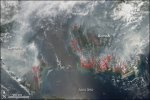
|
|
(10/04/2006) Forest fires are again burning across Borneo and Sumatra according to satellite images released this week by NASA. The fires, set on a seasonal basis for land-clearing for agriculture, have blanked the region with smoke that has interrupted air travel and driven air quality to unhealthy levels. The haze from earlier fires resulted in heated exchanges between Indonesian and Malaysian government officials who blamed each other for the conflagrations.
[
Indonesia]
Northeastern U.S. at risk from global warming
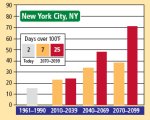
|
|
(10/04/2006) A new report warns that global warming will "substantially change" the climate in the northeastern if greenhouse gas emissions are not reduced. The report, by the Northeast Climate Impacts Assessment, says that "the Northeast can expect dramatic temperature increases and other climate changes over the course of this century" if emissions are not significantly curtailed. It says that under a high emissions scenario, Northeastern cities will experience an increased number of "extreme heat days" characterized by temperatures over 90°F, a 50 percent reduction in the number of days with snow on the ground, increased droughts, and stronger storms.
[
Climate Change]
Hospitals go green
(10/04/2006) Some hospitals are going "green" in an effort to cut pollution and toxic emissions that hurt the health of patients and surrounding communities according to an article in today's issue of The Wall Street Journal.
[
Green Business | Green Design]
Arctic sea ice levels fall
(10/04/2006) Arctic sea ice fell to the fourth lowest level on record according to researchers at the University of Colorado at Boulder.
[
Greenland-Arctic]
Farmers fight FDA over pet turtle ban
(10/04/2006) Farmers are battling the FDA over the legality of turtles that were once commonly kept as pets according to an article in today's issue of The Wall Street Journal.
[
Biodiversity | Oceans]
Albatrosses at risk due to fishing
(10/03/2006) About 1 percent of world's waved albatrosses were killed by fishermen in a one-year period according to a new study published online Sept. 26 in the journal Biological Conservation
[
Biodiversity | Oceans]
Up to 73 million sharks killed per year for their fins
(10/03/2006) Between 26 million and 73 million sharks are killed each year for their fins according to a new paper published in the October 2006 edition of Ecology Letters. The estimates are three times higher than those projected by the United Nations.
[
Biodiversity | Oceans]
Salmon Farms Kill Wild Fish
(10/03/2006) New research confirms that sea lice from fish farms kill wild salmon. Up to 95 per cent of the wild juvenile salmon that migrate past fish farms die as a result of sea lice infestation from the farms. The results of the research have been published in the Proceedings of the National Academy of Sciences of The United States of America.
[
Biodiversity | Oceans]
Wells Fargo Makes Largest Corporate Renewable Energy Purchase
(10/03/2006) Wells Fargo said today it will buy renewable energy certificates (RECs) to support generating 550 million kilowatt-hours of clean, renewable wind energy a year for three years. With this action, Wells Fargo becomes the largest corporate purchaser of renewable energy in the United States according to the U.S. Environmental Protection Agency.
[
Energy | Green Business]
Poison frogs less toxic when habitat degraded

|
|
(10/02/2006) A new study suggests habitat degradation may put some frogs at greater risk of predation by reducing their toxicity. Studying Mantella poison frogs on the island of Madagascar, a team of researchers found that frogs collected from intact forests "consistently have a greater diversity of insect-derived toxins accumulated in their skin than do frogs from disturbed and fragmented forests." The findings are significant because they suggest poison frogs could provide a measure for biological diversity.
[
Amphibians]
Ozone loss hits record in 2006
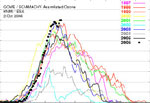
|
|
(10/02/2006) The European Space Agency (ESA) said that ozone loss in Antarctica hit a record in 2006. ESA reports that ozone measurements made by the Envisat satellite showed the ozone loss of 40 million tons of ozone, a level exceeding the previous record ozone loss of about 39 million tons for 2000. ESA's announcement comes a little more than a week after the World Meteorological Organization (WMO) reported that hole in the ozone layer over Antarctica will expand this year to 27.9 million square kilometers (10.8 million square miles), its second-highest recorded level in history.
[
Earth Science]
Privatize the Amazon rainforest says UK minister
(10/01/2006) At a summit this week in Mexico, David Miliband, Britain's Environment Secretary, will propose a plan to "privatize" the Amazon to allow the world's largest rainforest to be bought by individuals and groups, according to a report in The Telegraph newspaper online. The scheme, which has been endorsed by Prime Minister Tony Blair, would seek to protect the region's biodiversity while mitigating greenhouse gas emissions to fight global warming. According to The Telegraph the plan would "involve the creation of an international body to buy the rainforest before setting up a trust to sell trees" and buyers would become "stake-holders" in the rainforest. As of Sunday evening, Brazil -- the country that houses the bulk of the Amazon rainforest -- had not issued a statement in response to the proposal. In the past Brazil has objected to plans to turn the Amazon into an "international trust" calling such ideas a threat to its national sovereignty.
[
Brazil | Amazon]
